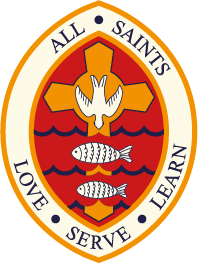Mathematics
Faculty Leader: Mr J Cassidy
The All Saints Catholic College Mathematics curriculum has been designed to teach our students a wide range of knowledge and scientific skills, preparing them for Post 16 study and beyond. The intent of the Mathematics curriculum is to:
- Deliver the national curriculum at KS3 and KS4 to a high standard.
- Develop mathematical fluency so that students can complete calculations quickly and accurately.
- Ensure students have numeracy and problem-solving skills applicable to other subjects and the wider world.
- Allow students to develop their mathematical abilities sufficiently to allow them to study Maths further if they choose.
- Develop strategies and skills to solve problems, particularly if these involve several steps and approaches.
- Teach students to analyse and evaluate data and information.
- Develop resilience to challenges.
- Foster independence so that the students become self-motivated more able to choose their own tasks and revision.
Key Stage 3
At Key Stage 3 students will develop their mathematical skills and knowledge in preparation for the GCSE studies. Mathematics at Key Stage 3 covers the following topics:
- Number
- Geometry
- Algebra
- Proportion
- Shape
- Graphs
- Data
Key Stage 4
At Key Stage 4 all students are entered for AQA GCSE Mathematics in Year 11 with some students additionally studying for AQA GCSE Statistics in Year 10. Throughout Years 10 and 11, students build upon their prior Key Stage 3 learning and in order to develop the skills needed to be successful in their exams and academic life. The AQA GCSE Mathematics covers the following topics:
- Number
- Algebra
- Geometry
- Ratio and Proportion
- Probability
- Statistics
Online System
In maths homework will be set once per fortnight on Mathswatch.
This system also supports independent study and students should use it on a regular basis to support their learning.
The following video is a guide to effective usage.
What can I do with a Mathematics qualification?
Maths is a subject which is included in the English Baccalaureate. This is the list of subjects which Sixth Form Colleges and universities prefer a student to have studied at least to GCSE level. Maths is the passport to Higher Education and a grade 4 or grade 5 pass or above is considered essential for most occupations.
Whether it is conserving endangered species, designing computer games or helping to solve crimes, people with a mathematical qualification are welcome in any career you care to mention. The creativity and logical thinking skills you develop in Mathematics are important in our rapidly changing world.
